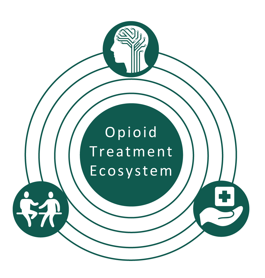County leaders asked to contact Congress on Medicaid jail issue
 Earlier this year, bipartisan bills were introduced in both the U.S. House and Senate to address the Medicaid Inmate Exclusion Policy (MEIP). The Due Process Continuity of Care Act and the Reentry Act were introduced in March, which would amend the Medicaid Inmate Exclusion Policy.
Earlier this year, bipartisan bills were introduced in both the U.S. House and Senate to address the Medicaid Inmate Exclusion Policy (MEIP). The Due Process Continuity of Care Act and the Reentry Act were introduced in March, which would amend the Medicaid Inmate Exclusion Policy.
Congress is currently negotiating the reauthorization of the Substance Use-Disorder Prevention that Promotes Opioid Recovery and Treatment (SUPPORT) for Patients and Communities Act of 2018 (P.L. 115-271), which expires on Sept. 30, 2023.
The Medicaid Inmate Exclusion Policy is a federal statute that terminates access to federal health benefits at the time of arrest. These bills would allow continuity of care via access to critical health services for incarcerated individuals. The Due Process Continuity of Care Act would “allow pretrial detainees to receive Medicaid benefits at the option of the state and provide $50 million in planning grant dollars to states and localities for implementing the MIEP repeal, improving the quality of care provided in jails and enhancing the number of available providers to treat this population.” The Reentry Act would “allow Medicaid payment for medical services furnished to an eligible incarcerated individual during the 30-day period preceding the individual’s release.” MAC, along with other stakeholders, has requested the Michigan Department of Health and Human Services apply for a Section 1115 waiver relating to the MIEP, allowing for Medicaid eligibility for incarcerated individuals prior to release.
MAC supports these bills and access to better care for incarcerated individuals in county jails. Should these bills pass, counties will have a streamlined process to provide effective behavioral health care and services for transitions to community care, and recidivism rates and risk for post-release overdoses will reduce.
As Congress works to reauthorize key programs within the SUPPORT Act, NACo and MAC urge you to contact your U.S. Representatives and Senators and ask them to support the inclusion of the following bipartisan bills that would address the Medicaid Inmate Exclusion Policy (MIEP):
- The Reentry Act (H.R. 2400/S.1165), which would allow Medicaid payment for medical services furnished to an incarcerated individual during the 30-day period preceding the individual’s release.
- The Due Process Continuity of Care Act(H.R. 3074/S.971), which would allow pretrial detainees to receive Medicaid benefits at the option of the state.
Send a letter to your U.S. Senators and Representatives using the NACo letter template.
Access the new Medicaid Inmate Exclusion Policy (MIEP) Advocacy Toolkit for talking points, sample social media posts and other advocacy resources.
For more information on this issue, please contact Samantha Gibson at gibson@micounties.org.
National settlement announced on PFAS
 Counties may soon be contacted regarding a national settlement over PFAS contamination. Chemical manufacturer 3M has agreed to pay more than $10 billion to settle lawsuits over the detection of PFAS in drinking water systems. The settlement will be paid over 13 years and could exceed the initial $10 billion.
Counties may soon be contacted regarding a national settlement over PFAS contamination. Chemical manufacturer 3M has agreed to pay more than $10 billion to settle lawsuits over the detection of PFAS in drinking water systems. The settlement will be paid over 13 years and could exceed the initial $10 billion.
In a press release from 3M, it was announced the settlement “provides funding for public water suppliers (PWS) nationwide that have detected PFAS in drinking water, as well as for eligible PWS that may detect PFAS at any level in the future.” The money can be used for remediation and prevention through filtering and testing.
PFAS is a harmful chemical found in food packaging, nonstick products and firefighting foam. Communities with airports, military bases, or plating factories may have higher levels of PFAS in their water systems due to runoff.
MAC has been made aware that some counties in Michigan have already been notified of a potential payout. There is limited information available publicly regarding next steps.
For more information on this issue, contact Madeline Fata at fata@micounties.org.
Juvenile justice reform efforts begin in Senate
 The MAC-backed juvenile justice reform bill package has been introduced in the Senate and referred to the Senate Committee on Civil Rights, Judiciary and Public Safety. The 20-bill package, Senate Bills 418–437, are a result of the Michigan Task Force on Juvenile Justice Reform’s recommendations provided last July. Identical bills, House Bills 4624–4643, have previously been introduced and referred to the House Criminal Justice Committee.
The MAC-backed juvenile justice reform bill package has been introduced in the Senate and referred to the Senate Committee on Civil Rights, Judiciary and Public Safety. The 20-bill package, Senate Bills 418–437, are a result of the Michigan Task Force on Juvenile Justice Reform’s recommendations provided last July. Identical bills, House Bills 4624–4643, have previously been introduced and referred to the House Criminal Justice Committee.
(UPDATE: Please see clarification on CCF rate changes in the Aug. 25, 2023, Legislative Update.)
The Task Force on Juvenile Justice Reform was established by Gov. Gretchen Whitmer in 2021 and was tasked with assessing Michigan’s juvenile justice data and identifying ways to improve the system. The bipartisan task force was chaired by Lt. Gov. Garlin Gilchrist and included members from all three branches of government and state and local level juvenile justice leaders and advocates. Two county commissioners served on the Task Force, each nominated by MAC. Alisha Bell of Wayne County represented a county with a population over 100,000, and Marlene Webster of Shiawassee County represented a county with under 100,000 in population. Rep. Sarah Lightner (R-Jackson), a former county commissioner, also served on the Task Force.
The Task Force offered 32 recommendations to the Legislature last year. Six priority areas have been identified and translated into the bill package.
The first bill in the package, Senate Bill 418, by Sen. Sylvia Santana (D-Wayne), enhances the Child Care Fund (CCF) by establishing a minimum framework of juvenile justice best practices statewide, including the use of risk screening and assessment tools. The best practices will be supported by an increase in the reimbursement rate for community-based services from 50 percent to 75 percent These changes are essential to ensuring counties have the resources to implement and utilize these approaches.
Senate Bills 419–423 require consistent use of validated screening and assessment tools to enable more objective decision-making and allow agencies to better match youth to appropriate supervision and services, reducing their likelihood to recidivate. The bills also expand the Diversion Act so that all offenses, with an exception for youth committing a specified juvenile violation, are eligible for pre-court diversion, based on the use of a risk-screening tool and other factors, and limit the time that a youth can be placed on pre-court diversion, unless the court determines that a longer period is needed. While diversion eligibility would be expanded, judicial discretion remains.
Senate Bills 424 and 425, by Sen. Sue Shink (D-Washtenaw), also a former county commissioner, would expand the Michigan Indigent Defense Commission to include development, oversight and compliance with youth defense standards in local county defense systems and expands the State Appellate Defender Office to include appellate services for juveniles.
Senate Bills 428–431 eliminate most non-restitution fees and costs associated with juvenile justice system involvement. The bills do not include the elimination of restitution or fees related to the Crime Victims Fund. For restitution and fees related to the Crime Victims Fund, the bills establish a standard procedure for ability to pay, determination of payment schedule, and total to be assessed.
Senate Bills 432–437 would strengthen and expand the Office of the Children’s Ombudsman for handling, investigating, and reporting incidents in juvenile facilities.
A committee hearing could take place before the end of summer. If not, hearings will resume this fall.
MAC supports this package and has shared a letter of support with members of the House Criminal Justice Committee.
For more information on this issue, contact Samantha Gibson at gibson@micounties.org.
Michigan Supreme Court rules in trial court funding case
 On Friday, July 7, the Michigan Supreme Court ruled in People v. Johnson, placing the fate of trial court funding back in the hands of the Legislature. Currently, a court’s authority to impose court fines and fees on criminal defendants has a legislative “sunset” of May 1, 2024.
On Friday, July 7, the Michigan Supreme Court ruled in People v. Johnson, placing the fate of trial court funding back in the hands of the Legislature. Currently, a court’s authority to impose court fines and fees on criminal defendants has a legislative “sunset” of May 1, 2024.
With this sunset, which has been extended three times since 2014, the Legislature must act prior to its expiration to implement proper trial court funding reform. In both concurring and dissenting opinions, The justices are urging the Legislature to act swiftly and provide a solution to this issue before the sunset date, specifically to address the recommendations provided by the Trial Court Funding Commission.
MAC and other stakeholders are working on legislation to adopt the Trial Court Funding Commission’s recommendations:
- Establish a Stable Court Funding System
- The State Shall Offer to Provide All Court Technology Needs
- Establish Uniform Assessments and Centralized Collections
- Move Toward a Uniform Employment System
- Establish a Transition Plan for the New Court Funding Model
MAC members should make sure their legislators are aware of the financial burden that will be placed on counties without action from the state and the need for legislative action prior to May 1, 2024.
For more information on this issue, contact Samantha Gibson at gibson@micounties.org.
Webinar on July 27 focuses on treating Opioid Use Disorder in jails
 On July 27, the next webinar in the Opioid Settlement Technical Assistance Learning Series will be held from 2:30 p.m. to 4 p.m. It will provide a discussion on treating opioid use disorder in jails.
On July 27, the next webinar in the Opioid Settlement Technical Assistance Learning Series will be held from 2:30 p.m. to 4 p.m. It will provide a discussion on treating opioid use disorder in jails.
The series is hosted by Michigan Department of Health and Human Services, in partnership with Michigan State University, the University of Michigan and Wayne State University, as part of their Technical Assistance Collaborative. The webinars are intended to provide information from experts for officials and representatives from counties, municipalities and townships, including community members, to aid in their opioid settlement investment processes.
See the flier and register by clicking “Register Today.”
For more information on opioid settlements are technical assistance, contact Amy Dolinky at dolinky@micounties.org.
 MAC releases RFP scoring template for opioid settlement spending
MAC releases RFP scoring template for opioid settlement spending
MAC has created supplemental documents to the Michigan Opioid Settlements Funds Toolkit: A Guide for Local Spending. The new template being released is the Request for Proposals (RFP) Scoring Template to be used in combination with the existing RFP Template and RFP Budget Template. To see all templates created by MAC, visit the Opioid Settlement Resource Center.
To request new templates, or if you have questions, contact Amy Dolinky at dolinky@micounties.org.
Treasury webinar reviews state budget, economy
![]()
A Michigan Treasury webinar, co-sponsored by MAC and other local government groups, was held on Thursday.
Specific topics covered were:
- State of Michigan Budget Update – State Treasurer, Rachael Eubanks
- Michigan Economic Update
- FY2024 Budget Changes for Local Governments
- Local Budget Planning Tips
Presentations and recordings from this webinar, along with previous webinars, can be found on the Bureau of Local Government and School Services – Learning Center webpage.
 Staff picks
Staff picks
- Pilot program explores burying power lines to improve reliability (Consumers Energy)
- Michigan looks to expand medications for opioid use disorder treatment in county jails (MSN.com)
- Bison’s comeback means big boost for a (Minnesota) county’s ecosystem (NACo News)
- MDHHS seeking proposals for substance use disorder treatment and recovery transportation services (Michigan Department of Health and Human Services)
